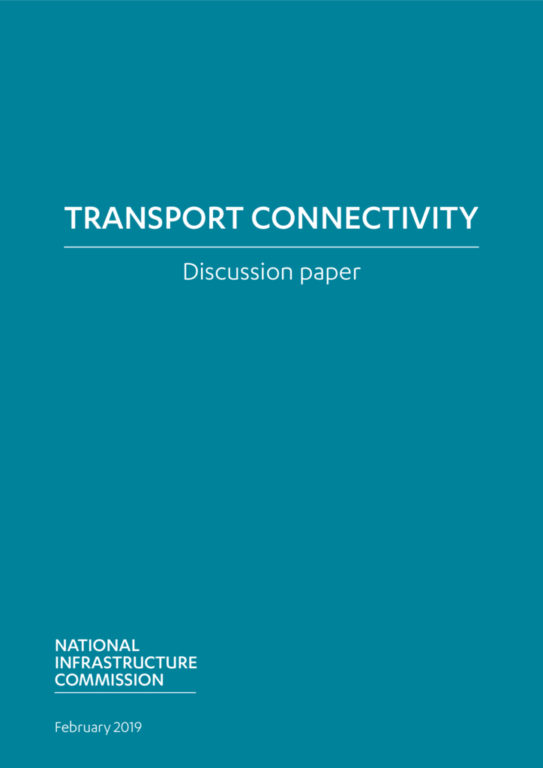National Infrastructure Assessment 1 (2018)
An assessment of the United Kingdom's infrastructure needs up to 2050.
Tagged: Design & FundingDigital & DataEnergy & Net ZeroEnvironmentNational Infrastructure AssessmentPlaceRegulation & ResilienceTransportWater & Floods
Introduction
This first-ever National Infrastructure Assessment for the United Kingdom made a series recommendations for how the identified infrastructure needs and priorities of the country should be addressed
The first Assessment mades a series of recommendations, including on:
- Low carbon energy – making a switch to low-carbon and renewable sources for both the country’s power and heating, combined with a move towards electric vehicles, would mean the customer of 2050 would pay the same in real terms for their energy as today
- Digital technology – that the Government devise a National Broadband Plan by Spring 2019, to deliver full fibre connections across the whole of the country, including those in rural areas – this should ensure that the technology is available to 15 million homes and businesses by 2025, 25 million by 2030, and all homes and businesses by 2033
- The future for the nation’s roads – that the Government work with councils and private companies to deliver a national network of charging points for electric vehicles and ensures that the impacts of connected and autonomous vehicles are taken into account when planning for the next rail control period and road investment strategy
- Encouraging growth of cities – that Metro Mayors and city leaders develop and implement long-term strategies for transport, employment and housing in their areas, to support economic growth, with new powers and devolved infrastructure budgets. The National Infrastructure Assessment’s spending plans include funding for projects including Crossrail 2 in London, and Northern Powerhouse Rail linking the major Northern cities, and recommends a boost in funding for major cities totalling £43 billion to 2040, with cities given stable five-year budgets, starting in 2021
- Tackling floods – that the Government should put in place a long-term strategy to deliver a nationwide standard of flood resilience by 2050 with funding for flood risk management increasing significantly over the coming decades
- Cutting waste – that new national rules for what can and cannot be recycled be introduced, with restrictions on the hardest-to-recycle plastics, aimed at increasing rates and reducing the amount of plastics going to incinerators. This would also mean that all food waste is separated making it available to create biogas, so it can be used to heat people’s homes and potentially as a transport fuel.
More information on each chapter of the Assessment can be found in the tabbed content.
Next Section: Executive summary
The UK must take decisive action to have world class infrastructure.
Executive summary
The UK must take decisive action to have world class infrastructure.
Infrastructure can inspire confidence and growth. But long term projects require a long term vision, lasting plans, and stable funding.
Too often, the delivery of the UK’s major infrastructure projects has been slow and uncertain. Airport expansion in the south east is the best known, but not the only, example. The Mersey Gateway Bridge, which opened in October 2017, was proposed in 1994. Crossrail, due to open this year, was originally proposed in 1974. Consequently, much of the country’s infrastructure has not kept pace with population growth, demand and advances in technology. The UK must stop running to stand still.
The National Infrastructure Commission was set up to address the problems with long term infrastructure planning in the UK. This first National Infrastructure Assessment builds on the analysis in the Commission’s interim report, Congestion, Capacity, Carbon: Priorities for national infrastructure, to set out a long term vision for high quality, good value, sustainable economic infrastructure for the UK, and a clear plan to achieve it.
Its core principles include:
- nationwide full fibre broadband by 2033
- half of the UK’s power provided by renewables by 2030
- three quarters of plastic packaging recycled by 2030
- £43 billion of stable long term transport funding for regional cities
- preparing for 100 per cent electric vehicle sales by 2030
- ensuring resilience to extreme drought through additional supply and demand reduction
- a national standard of flood resilience for all communities by 2050.
It also highlights the most important future challenges. Heating must no longer be provided by natural gas, a fossil fuel. The UK must prepare for connected and autonomous vehicles. These need more time for evidence or technology to develop. The Assessment sets out the actions needed to enable robust decisions to be taken in future.
Next Section: Building a digital society
Full fibre broadband nationwide to promote digital connectivity
Building a digital society
Full fibre broadband nationwide to promote digital connectivity
Digital connectivity will increasingly drive the country’s economic growth, competitiveness and quality of life. Digital communications makes it easier for customers and suppliers to find each other and exchange goods and services. In future, innovations such as artificial intelligence and the internet of things will bring new applications that rely on digital connectivity, from driverless cars to increased use of virtual reality.
Government needs to make a decision on full fibre now to avoid the risk of the UK being left behind in years to come. Full fibre will deliver benefits to current broadband even if the expected demand growth does not materialise. Enhanced digital connectivity will also facilitate the development of smart infrastructure: infrastructure with digital connections, enabling more efficient management and maintenance.
A nationwide full fibre connectivity plan
The Commission recommends that government should set out a nationwide full fibre connectivity plan by spring 2019, including proposals for connecting rural and remote communities. This should ensure that full fibre connectivity is available to 15 million homes and businesses by 2025, 25 million by 2030 with full coverage by 2033. To achieve these targets:
- Ofcom should promote network competition to drive the commercial rollout of full fibre, by deregulating where competition is effective and guaranteeing a fair bet on risky investments before regulating any uncompetitive areas
- Government should part subsidise rollout to rural and remote communities, beginning by 2020, starting with the hardest to reach areas and community self-build
- Government and Ofcom should allow for copper switch-off by 2025
- Government and Ofcom should take action to cut the cost of full fibre deployment including: Government should ensure the processes for obtaining wayleaves and connecting new builds are the same for digital infrastructure as other utilities by 2019; Local government should designate ‘digital champions’ to improve telecoms processes such as street work permissions and access to publicly owned assets; Ofcom should monitor the accessibility of Openreach’s duct and pole infrastructure by levels of usage.
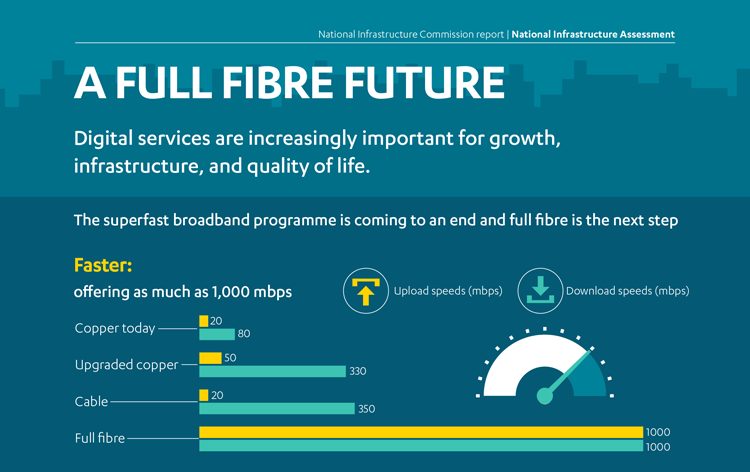
Next Section: Low cost, low carbon
De-carbonising how the UK powers and heat its homes and deals with waste
Low cost, low carbon
De-carbonising how the UK powers and heat its homes and deals with waste
The UK can and should have low cost and low carbon electricity, heat and waste. Ten years ago, it seemed almost impossible that the UK would be able to be powered mainly be renewable energy in an affordable and reliable way. But there has been a quiet revolution going on in this area. There is ample scope to build on this success in years to come. Highly renewable, clean, and low cost energy and waste systems increasingly appear to be achievable.
Sustaining progress on reducing emissions requires government to show ambition. The crucial first step is to enable an increasing deployment of renewables. The Commission’s modelling has shown that a highly renewable generation mix is a low cost option for the energy system. The cost would be comparable to building further nuclear power plants after Hinkley Point C, and cheaper than implementing carbon capture and storage with the existing system. The electricity system should be running off 50 per cent renewable generation by 2030, as part of a transition to a highly renewable generation mix. Government should not agree support for more than one nuclear power station beyond Hinkley Point C before 2025.
Accelerating the transition to a highly renewable generation mix
The Commission recommends that government should set out a pipeline of pot 1 Contracts for Difference auctions, to deliver at least 50 per cent renewable generation by 2030, as part of the transition to a highly renewable generation mix. Government should:
- Move technologies that have recently become cost competitive, such as offshore wind, to pot 1 following the next Contracts for Difference auction in Spring 2019. Pot 1 should be used for the overwhelming majority of the increase in renewable capacity required
- Publish indicative auction dates and budgets for the next decade by 2020
- Over time take whole systems costs into account in Contracts for Difference auctions, as far as possible
- Consider whether there is a case for a small-scale, pot 2 auction in the 2020s, if there are technologies which are serious contenders for future pot 1 auctions
- Not agree support for more than one nuclear power station beyond Hinkley Point C, before 2025.
More progress towards zero carbon heat
The Commission recommends that government needs to make progress towards zero carbon heat:
- Establishing the safety case for using hydrogen as a replacement for natural gas, followed by trialling hydrogen at community scale by 2021
- Subject to the success of community trials, launching a trial to supply hydrogen to at least 10,000 homes by 2023, including hydrogen production with carbon capture and storage
- By 2021, government should establish an up to date evidence base on the performance of heat pumps within the UK building stock and the scope for future reductions in the cost of installation
- Set a target for the rate of installations of energy efficiency measures in the building stock of 21,000 measures a week by 2020, maintained at this level until a decision on future heat infrastructure is taken. Policies to deliver this should include: Allocating £3.8 billion between now and 2030 to deliver energy efficiency improvements in social housing; Government continuing to trial innovative approaches for driving energy efficiency within the owner occupier market; Government setting out, by the end of 2018, how regulations in the private rented sector will be tightened and enforced over time.
Increasing recycling rates of municipal waste and plastic packaging
The Commission recommends that government should set a target for recycling 65 per cent of municipal waste and 75 per cent of plastic packaging by 2030. Government should set individual targets for all local authorities and provide financial support for transitional costs. The government should establish:
- Separate food waste collection for households and businesses (to enable production of biogas) by 2025
- Clear two symbol labelling (recyclable or not recyclable) across the UK by 2022
- A consistent national standard of recycling for households and businesses by 2025
- Restrictions on the use of hard-to-recycle plastic packaging (PVC and polystyrene) by 2025
- Incentives to reduce packaging and for product design that is more easily recyclable by 2022
- A common data reporting framework for businesses handling commercial and industrial waste by the end of 2019, ideally through voluntary reporting but if necessary by legislation.
Note: on 16 April 2019 the Chief Executive of the National Infrastructure Commission wrote to the Chair of the Business, Energy & Industrial Strategy (BEIS) Select Committee to provide additional information and correct two errors identified in this chapter. A copy of the letter is available here.
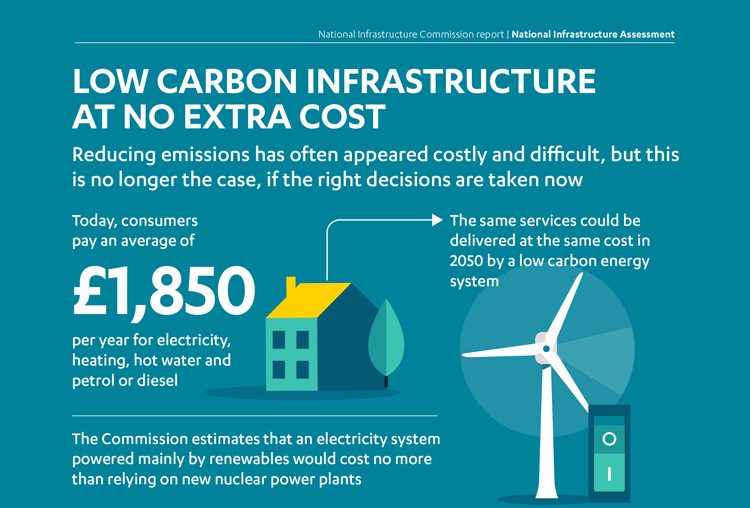
Next Section: Revolutionising road transport
Preparing the UK for the growth of electric and autonomous vehicles
Revolutionising road transport
Preparing the UK for the growth of electric and autonomous vehicles
By 2050, road transport will be unrecognizable from today. Cars and vans will be electric, and increasingly autonomous. Electric, connected and autonomous vehicles will change the nature of the transport debate in the UK. Electric vehicles are easier to drive, quieter and less polluting than conventional cars and will soon have the same range and be cheaper to buy and maintain. Once this happens, their take up could increase rapidly. Given their benefits for the environment, this is something government should encourage. A key way to do this is by ensuring that charging an electric vehicle is as easy as refilling a conventional vehicle, or even easier.
In the longer term, connected and autonomous vehicles will bring even greater changes to the UK’s roads. They will improve safety, and could allow more people to use personal transport and free up driving time for work or leisure. They may even encourage a shift towards increased vehicle sharing and reduced car ownership. Traffic lights and stop signs may become unnecessary, speed limits could be higher, and the use of road space could be automatically and constantly changing according to need. But, with road and rail projects lasting for decades, government needs to start taking the potential future impacts into account now as it makes investment plans.
Rolling out charging infrastructure to enable 100 per cent electric new car and van sales by 2030
The Commission recommends that government, Ofgem and local authorities should enable the roll out of charging infrastructure sufficient to allow consumer demand to reach close to 100 per cent electric new car and van sales by 2030. Government should address the implications of technological innovation in long term transport planning processes, including the next rail control period and road investment strategy.
- Ofgem should take on the role of regulating the interaction between electric vehicle charge points and the electricity network immediately, ensuring that electric vehicle charging and vehicle to grid services contribute to the optimisation of the energy system. Government, industry and Ofgem should work together to set minimum standards for a network of interoperable, smart charge points
- Ofgem should commission electricity network operators to work with charge point providers to identify potential anticipatory investments required to accommodate public charging infrastructure. Opportunities for investment within the current price control period should be identified by Summer 2019
- Government should place a requirement on local authorities to work with charge point providers to allocate 5 per cent of their parking spaces (including on-street) by 2020 and 20 per cent by 2025 which may be converted to electric vehicle charge points
- Government should subsidise, by 2022, the provision of rapid charge points in rural and remote areas, where the market will not deliver in the short term
- Government should establish a centre for advanced transport technology in the Department for Transport to bring together work on technological innovation and ensure its implications are central to future investment proposals. This should include developing and overseeing the Commission’s proposed connected and autonomous vehicles framework.
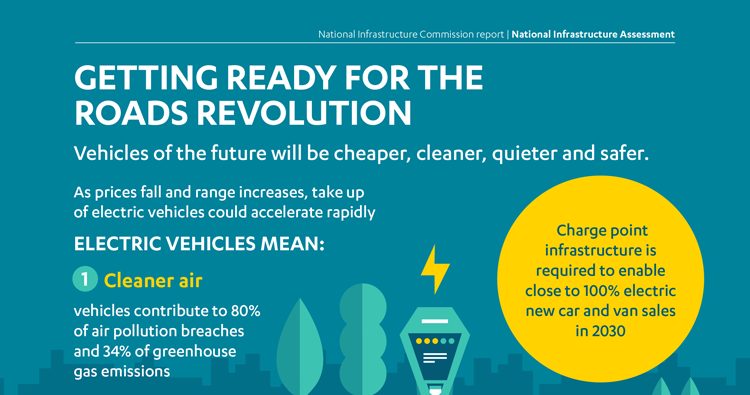
Next Section: Transport and housing for thriving city regions
Well designed, liveable, flourishing cities driving growth
Transport and housing for thriving city regions
Well designed, liveable, flourishing cities driving growth
Cities can be great places to live, with excellent public transport systems, well-designed public spaces for leisure and social activities, and flourishing, well-connected businesses. They are also engines of economic growth.
However, as urban populations increase, many cities are becoming full and congested, and this is inhibiting economic development and reducing quality of life. For all their benefits, neither electric nor connected and autonomous vehicles will solve the problems of urban transport; rather they are likely to increase the number of drivers on the roads.
Government and cities need to act now to ensure that space in cities is used effectively, with room allocated for fast, frequent public transport systems, well-connected and affordable housing, and pleasant public spaces. This will require a new approach to governance, strategy and funding.
To deliver thriving cities, metro mayors and other city leaders should develop integrated strategies for transport, employment and housing. Housing and infrastructure should be planned together: new housing requires new infrastructure. These integrated strategies should be backed up by stable, substantial, devolved funding. And for the cities that face the most severe capacity constraints, and with the most potential for growth, there should be additional funding to support major upgrade programmes, which would be agreed between the cities and central government.
Cities should have the powers and funding they need to pursue ambitious, integrated strategies for transport, employment and housing
The Commission recommends that government should make £500 million a year of funding available from 2025/26 to 2034/35 for local highways authorities to address the local road maintenance backlog.
The Commission recommends that cities should have the powers and funding they need to pursue ambitious, integrated strategies for transport, employment and housing.
- By 2021, metro mayors and city leaders should develop and implement long term integrated strategies for transport, employment and housing that will support growth in their cities
- By 2021, government should ensure city leaders have the right powers to deliver these integrated strategies, including the power for metro mayors to make decisions on major housing development sites
- Government should set out devolved infrastructure budgets for individual cities for locally determined urban transport priorities in line with the funding profile set out by the Commission. Budgets for 2021-2026 should be confirmed by mid 2019. Government should pass legislation, by 2020, requiring cities to be given regular five year infrastructure budgets
- Government should allocate significant long term funding for major capacity upgrades in selected growth priority cities, in line with the funding profile set out by the Commission. Cities benefiting from major projects should make commitments on housing delivery and provide at least 25 per cent of funding. Priority cities should be identified by mid 2019, with long term investment commitments agreed by 2020. Future rounds should take place no more than twice a parliament.
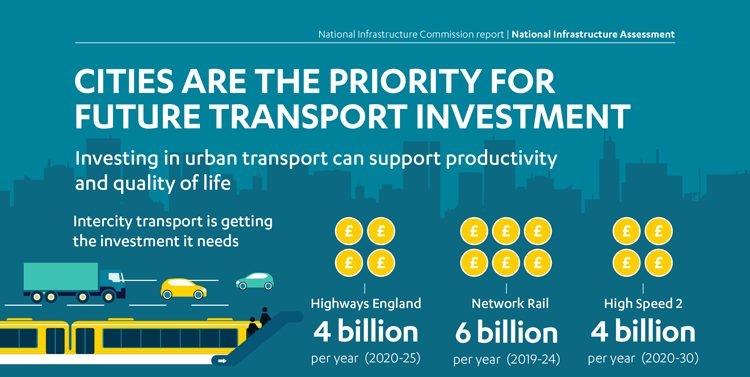
Next Section: Reducing the risks of drought and flooding
Building resilience in the face of the effects of climate change
Reducing the risks of drought and flooding
Building resilience in the face of the effects of climate change
Climate change will continue to make extreme weather events such as floods and drought more likely in future years, and cities, towns and villages must be resilient. Decisive policy action is needed to mitigate these risks. About 5 million properties in the UK are currently at risk of flooding. Protection from floods in the UK over the past years has too often been reactive rather than proactive. Ideally, no one should be exposed to flooding. Flooding has severe impacts on quality of life, particularly mental health.
A long term strategy for flood protection would allow a nationwide standard of resilience to flooding, with catchment based plans. These plans should evaluate the full range of options including traditional flood defences, ‘green infrastructure’ (whether natural flood management or sustainable drainage systems), individual property measures and spatial planning.
Ahead of the Assesment, the Commission published a standalone report Preparing for a drier future: England’s water infrastructure needs, which set out a twin-track approach to manage water supply and demand. The government, working with Ofwat and water companies, needs to ensure the capacity of the water supply system in England is increased to boost the country’s resilience to drought whilst also managing demand and reducing leakage.
A strategy to deliver a nationwide standard of resilience to flooding
The Commission recommends that government should set out a strategy to deliver a nationwide standard of resilience to flooding with an annual likelihood of 0.5 per cent by 2050 where this is feasible. A higher standard of 0.1 per cent should be provided for densely populated areas where the costs per household are lower. To deliver the strategy:
- By the end of 2019, government should put in place a rolling 6 year funding programme in line with the funding profile set out by the Commission. This should enable efficient planning and delivery of projects and address the risks from all sources of flooding
- The Environment Agency should update plans for all catchments and coastal cells in England before the end of 2023. These should identify how risk can be managed most effectively using a combination of measures including green and grey infrastructure, spatial planning and property level measures
- Water companies and local authorities should work together to publish joint plans to manage surface water flood risk by 2022
- The Ministry of Housing, Communities and Local Government and planning authorities should ensure that from 2019 all new development is resilient to flooding with an annual likelihood of 0.5 per cent for its lifetime and does not increase risk elsewhere.
Ensure plans are in place to deliver additional water supply and reduce demand
The Commission recommends that government should ensure that plans are in place to deliver additional supply and demand reduction of at least 4,000 Ml/day. Action to deliver this twin-track approach should start immediately:
- Ofwat should launch a competitive process by the end of 2019, complementing the Price Review, so that at least 1,300 Ml/day is provided through (i) a national water network and (ii) additional supply infrastructure by the 2030s
- The Department for Environment, Food and Rural Affairs should set an objective for the water industry to halve leakage by 2050, with Ofwat agreeing 5 year commitments for each company (as part of the regulatory cycle) and reporting on progress
- The Department for Environment, Food and Rural Affairs should enable companies to implement compulsory metering by the 2030s beyond water stressed areas, by amending regulations before the end of 2019 and requiring all companies to consider systematic roll out of smart meters as a first step in a concerted campaign to improve water efficiency.
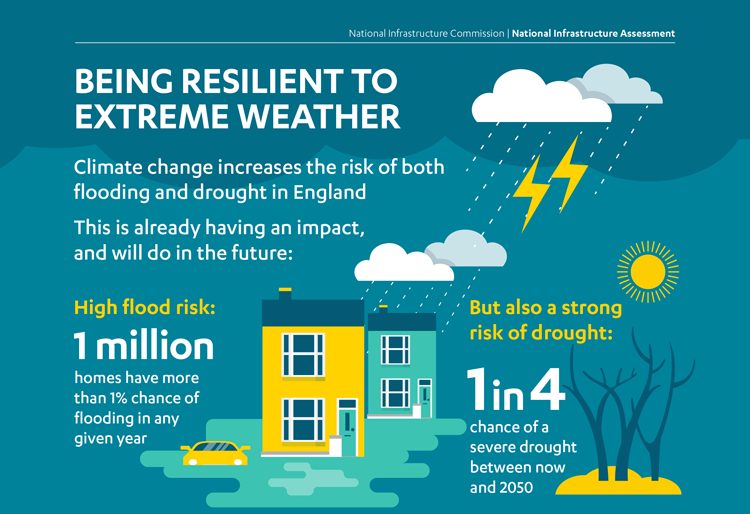
Next Section: Choosing and designing infrastructure
Making better decisions to deliver high quality infrastructure
Choosing and designing infrastructure
Making better decisions to deliver high quality infrastructure
For government and relevant industries to take decisive action on their infrastructure projects, they need to have confidence that their decision making is as good as possible. Long term decisions inevitably carry risk, but these risks need to be taken, and uncertainty managed as much as possible.
Decision making can be improved through robust analysis of the performance of existing infrastructure and recognising the value of good design in infrastructure. Not everything can be reduced to numbers, but there should be an effective methodology to measure the quality of the UK’s current infrastructure to reliably inform assessments of future needs.
Publish good quality data on infrastructure costs and performance
The Commission recommends that government should publish good quality data on infrastructure costs and performance. All public bodies taking decisions on strategic economic infrastructure should publish the forecast costs and benefits of their major infrastructure projects at each appraisal stage and at a suitable point after completion, by the end of 2019. The Infrastructure and Projects Authority should work with departments to ensure that costs are comparable between sectors.
Design should be embedded into the culture of infrastructure planning
The Commission recommends that design should be embedded into the culture of infrastructure planning, to save money, reduce risk, add value, support environmental net gain and create a legacy that looks good and works well, by:
- Government ensuring that all Nationally Significant Infrastructure Projects, including those authorised through hybrid parliamentary bills, have a board level design champion and use a design panel to maximise the value provided by the infrastructure
- Design panels for nationally significant infrastructure projects having regard to design principles to be published by the National Infrastructure Commission based on advice received from the Design Group.
Next Section: Funding and financing
Delivering greater certainty and value for money
Funding and financing
Delivering greater certainty and value for money
While the Commission’s recommendations comprise an ambitious programme of investment, this is not an unaffordable wish list. A crucial factor in the development of this Assessment has been the fiscal remit set by government. This provides a long-term funding guideline for public investment in infrastructure of 1.0 to 1.2 per cent of GDP, including existing government funding commitments such as HS2.
Where infrastructure is funded by the private sector, and the costs of any recommendations will ultimately be met directly by consumers, the Commission has also provided a transparent assessment of the overall impact on bills. Where recommendations have net costs, the Commission believes that these are manageable and good value relative to the benefits the infrastructure provides.
The recommendations in this Assessment, and the implications for public expenditure and for bills, reflect the judgement of the Commission. In reaching its conclusions, the Commission has drawn on a wide range of evidence. Uncertainty is inevitable given the timescales for infrastructure investment, and so the Commission has also sought to understand how robust its decisions are to uncertainty, seeking solutions that will stand the test of time.
Deliver long term certainty over infrastructure funding
The Commission recommends that government should deliver long term certainty over infrastructure funding by adopting the funding profile set out in the ‘fiscal remit’ table in Spending Review 2019 and other future spending plans.
Establish an independent UK infrastructure finance institution
The Commission recommends that government should maintain access to the European Investment Bank if possible. If access is lost, a new, operationally independent, UK infrastructure finance institution should be established by 2021. To enable this, government should consult on a proposed design of the new institution by Spring 2019. The consultation should cover:
- Functions, including provision of finance to economic infrastructure projects in cases of market and coordination failures; catalysing innovation; and acting as a centre of excellence on infrastructure project development, procurement and delivery
- A clear mandate, including sound banking, additionality and having a wider economic and social impact
- Governance to safeguard the operational independence of the institution.
Note: the new UK Infrastructure Bank announced by the government in its National Infrastructure Strategy of November 2020, was informed by the Commission’s recommendation. It began operating officially in Leeds in June 2021.
Enable local authorities to capture a fair proportion of land value increases from planning and infrastructure provision
The Commission recommends that local authorities should be given further powers to capture a fair proportion of increases in the value of land from planning and infrastructure provision. To enable this, government should:
- Remove pooling restrictions on Section 106 in all circumstances, through forthcoming secondary legislation by 2020
- Remove the ballot requirement for upper tier authorities’ powers to levy a business rate supplement of 2p or less in the pound for infrastructure, except where the supplement exceeds one third of scheme costs by 2021
- Give local authorities powers to levy zonal precepts on council tax, where public investments in infrastructure drive up surrounding property values by 2021
- Provide greater certainty in compulsory purchase compensation negotiations by including independent valuations early in the process to be paid for by the acquiring authority by 2021.
Next Section: Next steps
A better way of planning and delivering infrastructure
Next steps
A better way of planning and delivering infrastructure
The Commission has outlined an ambitious set of recommendations. As the first Assessment, it could never solve everything. The Commission has therefore focused on key priorities to equip the UK with the infrastructure it needs. These recommendations will enable the UK to have a thriving digital economy, a low cost, low carbon energy and waste network, clean air, successful cities, and resilience to extreme weather.
But the Commission cannot achieve this alone. Government, regulators, industry, citizen and others will all need to contribute to making this vision a reality. Over the coming months, the Commission will work to build consensus around its recommendations.
The government’s response will set out which recommendations it has agreed to, any further work required to take forward the recommendations, and alternative proposals for any recommendations it has not agreed. The Commission will monitor progress in delivering government endorsed recommendations, and will report on this in its Annual Monitoring Reports. The second Assessment, expected around 2023, will build on the recommendations in this report, as well as covering new ground.
Next Section: Recommendations
The UK's first National Infrastructure Assessment made a number of specific recommendations in thirteen different areas of policy. Each recommendation is detailed below.
Recommendations
The UK's first National Infrastructure Assessment made a number of specific recommendations in thirteen different areas of policy. Each recommendation is detailed below.
A nationwide full fibre connectivity plan
The Commission recommends that government should set out a nationwide full fibre connectivity plan by spring 2019, including proposals for connecting rural and remote communities. This should ensure that full fibre connectivity is available to 15 million homes and businesses by 2025, 25 million by 2030 with full coverage by 2033. To achieve these targets:
- Ofcom should promote network competition to drive the commercial rollout of full fibre, by deregulating where competition is effective and guaranteeing a fair bet on risky investments before regulating any uncompetitive areas.
- Government should part subsidise rollout to rural and remote communities, beginning by 2020, starting with the hardest to reach areas and community self-build.
- Government and Ofcom should allow for copper switch-off by 2025.
- Government and Ofcom should take action to cut the cost of full fibre deployment including:
- Government should ensure the processes for obtaining wayleaves and connecting new builds are the same for digital infrastructure as other utilities by 2019.
- Local government should designate ‘digital champions’ to improve telecoms processes such as street work permissions and access to publicly owned assets.
- Ofcom should monitor the accessibility of Openreach’s duct and pole infrastructure by levels of usage.
Accelerating the transition to a highly renewable generation mix
The Commission recommends that government should set out a pipeline of pot 1 Contracts for Difference auctions, to deliver at least 50 per cent renewable generation by 2030, as part of the transition to a highly renewable generation mix. Government should:
- Move technologies that have recently become cost competitive, such as offshore wind, to pot 1 following the next Contracts for Difference auction in Spring 2019. Pot 1 should be used for the overwhelming majority of the increase in renewable capacity required.
- Publish indicative auction dates and budgets for the next decade by 2020.
- Over time take whole systems costs into account in Contracts for Difference auctions, as far as possible.
- Consider whether there is a case for a small-scale, pot 2 auction in the 2020s, if there are technologies which are serious contenders for future pot 1 auctions.
- Not agree support for more than one nuclear power station beyond Hinkley Point C, before 2025.
More progress towards zero carbon heat
The Commission recommends that government needs to make progress towards zero carbon heat:
- Establishing the safety case for using hydrogen as a replacement for natural gas, followed by trialling hydrogen at community scale by 2021.
- Subject to the success of community trials, launching a trial to supply hydrogen to at least 10,000 homes by 2023, including hydrogen production with carbon capture and storage.
- By 2021, government should establish an up to date evidence base on the performance of heat pumps within the UK building stock and the scope for future reductions in the cost of installation.
- Set a target for the rate of installations of energy efficiency measures in the building stock of 21,000 measures a week by 2020, maintained at this level until a decision on future heat infrastructure is taken. Policies to deliver this should include:
- Allocating £3.8 billion between now and 2030 to deliver energy efficiency improvements in social housing.
- Government continuing to trial innovative approaches for driving energy efficiency within the owner occupier market.
- Government setting out, by the end of 2018, how regulations in the private rented sector will be tightened and enforced over time.
Increasing recycling rates of municipal waste and plastic packaging
The Commission recommends that government should set a target for recycling 65 per cent of municipal waste and 75 per cent of plastic packaging by 2030. Government should set individual targets for all local authorities and provide financial support for transitional costs. The government should establish:
- Separate food waste collection for households and businesses (to enable production of biogas) by 2025.
- Clear two symbol labelling (recyclable or not recyclable) across the UK by 2022.
- A consistent national standard of recycling for households and businesses by 2025.
- Restrictions on the use of hard-to-recycle plastic packaging (PVC and polystyrene) by 2025.
- Incentives to reduce packaging and for product design that is more easily recyclable by 2022.
- A common data reporting framework for businesses handling commercial and industrial waste by the end of 2019, ideally through voluntary reporting but if necessary by legislation.
Rolling out charging infrastructure to enable 100 per cent electric new car and van sales by 2030
The Commission recommends that government, Ofgem and local authorities should enable the roll out of charging infrastructure sufficient to allow consumer demand to reach close to 100 per cent electric new car and van sales by 2030. Government should address the implications of technological innovation in long term transport planning processes, including the next rail control period and road investment strategy.
- Ofgem should take on the role of regulating the interaction between electric vehicle charge points and the electricity network immediately, ensuring that electric vehicle charging and vehicle to grid services contribute to the optimisation of the energy system. Government, industry and Ofgem should work together to set minimum standards for a network of interoperable, smart charge points
- Ofgem should commission electricity network operators to work with charge point providers to identify potential anticipatory investments required to accommodate public charging infrastructure. Opportunities for investment within the current price control period should be identified by Summer 2019
- Government should place a requirement on local authorities to work with charge point providers to allocate 5 per cent of their parking spaces (including on-street) by 2020 and 20 per cent by 2025 which may be converted to electric vehicle charge points
- Government should subsidise, by 2022, the provision of rapid charge points in rural and remote areas, where the market will not deliver in the short term
- Government should establish a centre for advanced transport technology in the Department for Transport to bring together work on technological innovation and ensure its implications are central to future investment proposals. This should include developing and overseeing the Commission’s proposed connected and autonomous vehicles framework.
Cities should have the powers and funding they need to pursue ambitious, integrated strategies for transport, employment and housing
The Commission recommends that government should make £500 million a year of funding available from 2025/26 to 2034/35 for local highways authorities to address the local road maintenance backlog.
The Commission recommends that cities should have the powers and funding they need to pursue ambitious, integrated strategies for transport, employment and housing.
- By 2021, metro mayors and city leaders should develop and implement long term integrated strategies for transport, employment and housing that will support growth in their cities.
- By 2021, government should ensure city leaders have the right powers to deliver these integrated strategies, including the power for metro mayors to make decisions on major housing development sites.
- Government should set out devolved infrastructure budgets for individual cities for locally determined urban transport priorities in line with the funding profile set out by the Commission. Budgets for 2021-2026 should be confirmed by mid 2019. Government should pass legislation, by 2020, requiring cities to be given regular five year infrastructure budgets.
- Government should allocate significant long term funding for major capacity upgrades in selected growth priority cities, in line with the funding profile set out by the Commission. Cities benefiting from major projects should make commitments on housing delivery and provide at least 25 per cent of funding. Priority cities should be identified by mid 2019, with long term investment commitments agreed by 2020. Future rounds should take place no more than twice a parliament.
A strategy to deliver a nationwide standard of resilience to flooding
The Commission recommends that government should set out a strategy to deliver a nationwide standard of resilience to flooding with an annual likelihood of 0.5 per cent by 2050 where this is feasible. A higher standard of 0.1 per cent should be provided for densely populated areas where the costs per household are lower. To deliver the strategy:
- By the end of 2019, government should put in place a rolling 6 year funding programme in line with the funding profile set out by the Commission. This should enable efficient planning and delivery of projects and address the risks from all sources of flooding.
- The Environment Agency should update plans for all catchments and coastal cells in England before the end of 2023. These should identify how risk can be managed most effectively using a combination of measures including green and grey infrastructure, spatial planning and property level measures.
- Water companies and local authorities should work together to publish joint plans to manage surface water flood risk by 2022.
- The Ministry of Housing, Communities and Local Government and planning authorities should ensure that from 2019 all new development is resilient to flooding with an annual likelihood of 0.5 per cent for its lifetime and does not increase risk elsewhere.
Ensure plans are in place to deliver additional water supply and reduce demand
The Commission recommends that government should ensure that plans are in place to deliver additional supply and demand reduction of at least 4,000 Ml/day. Action to deliver this twin-track approach should start immediately:
- Ofwat should launch a competitive process by the end of 2019, complementing the Price Review, so that at least 1,300 Ml/day is provided through (i) a national water network and (ii) additional supply infrastructure by the 2030s.
- The Department for Environment, Food and Rural Affairs should set an objective for the water industry to halve leakage by 2050, with Ofwat agreeing 5 year commitments for each company (as part of the regulatory cycle) and reporting on progress.
- The Department for Environment, Food and Rural Affairs should enable companies to implement compulsory metering by the 2030s beyond water stressed areas, by amending regulations before the end of 2019 and requiring all companies to consider systematic roll out of smart meters as a first step in a concerted campaign to improve water efficiency.
Publish good quality data on infrastructure costs and performance
The Commission recommends that government should publish good quality data on infrastructure costs and performance. All public bodies taking decisions on strategic economic infrastructure should publish the forecast costs and benefits of their major infrastructure projects at each appraisal stage and at a suitable point after completion, by the end of 2019. The Infrastructure and Projects Authority should work with departments to ensure that costs are comparable between sectors.
Design should be embedded into the culture of infrastructure planning
The Commission recommends that design should be embedded into the culture of infrastructure planning, to save money, reduce risk, add value, support environmental net gain and create a legacy that looks good and works well, by:
- Government ensuring that all Nationally Significant Infrastructure Projects, including those authorised through hybrid parliamentary bills, have a board level design champion and use a design panel to maximise the value provided by the infrastructure.
- Design panels for nationally significant infrastructure projects having regard to design principles to be published by the National Infrastructure Commission based on advice received from the national infrastructure design group.
Deliver long term certainty over infrastructure funding
The Commission recommends that government should deliver long term certainty over infrastructure funding by adopting the funding profile set out in the ‘fiscal remit’ table in Spending Review 2019 and other future spending plans.
Establish an independent UK infrastructure finance institution
The Commission recommends that government should maintain access to the European Investment Bank if possible. If access is lost, a new, operationally independent, UK infrastructure finance institution should be established by 2021. To enable this, government should consult on a proposed design of the new institution by Spring 2019. The consultation should cover:
- Functions, including provision of finance to economic infrastructure projects in cases of market and coordination failures; catalysing innovation; and acting as a centre of excellence on infrastructure project development, procurement and delivery.
- A clear mandate, including sound banking, additionality and having a wider economic and social impact.
- Governance to safeguard the operational independence of the institution.
Enable local authorities to capture a fair proportion of land value increases from planning and infrastructure provision
The Commission recommends that local authorities should be given further powers to capture a fair proportion of increases in the value of land from planning and infrastructure provision. To enable this, government should:
- Remove pooling restrictions on Section 106 in all circumstances, through forthcoming secondary legislation by 2020.
- Remove the ballot requirement for upper tier authorities’ powers to levy a business rate supplement of 2p or less in the pound for infrastructure, except where the supplement exceeds one third of scheme costs by 2021.
- Give local authorities powers to levy zonal precepts on council tax, where public investments in infrastructure drive up surrounding property values by 2021.
- Provide greater certainty in compulsory purchase compensation negotiations by including independent valuations early in the process to be paid for by the acquiring authority by 2021.
Next Section: Assessment remit
The Commission is required to carry out an overall assessment of the UK’s infrastructure requirements once every five years
Assessment remit
The Commission is required to carry out an overall assessment of the UK’s infrastructure requirements once every five years
The first such assessment was published in July 2018. It covers all the key sectors of economic infrastructure, setting out recommendations for transport, energy, water and waste water, flood resilience, digital connectivity, and solid waste, from now until 2050.
The Commission’s remit also includes the potential interactions between its infrastructure recommendations and housing, but not housing supply in general. The Assessment is guided by the Commission’s objectives to support sustainable economic growth across all regions of the UK, improve competitiveness and improve quality of life.
The government has given the Commission a long term funding guideline for its recommendations, known as the ‘fiscal remit’. Confirmation of this remit, alongside the areas to be covered in the Assessment, is set out in a letter from the Chancellor sent in November 2016.
Next Section: Supporting evidence
The National Infrastructure Assessment was developed through an extensive two year programme of research, analysis and consultation
Supporting evidence
The National Infrastructure Assessment was developed through an extensive two year programme of research, analysis and consultation
The strategies within the Assessment were informed by responses to the Commission’s consultation following the publication of the interim report Congestion, Capacity, Carbon: Priorities for national infrastructure. The Commission also worked closely with experts, seeking diverse views across sectors and regions, asking the public for their views, and through internal analysis and modelling.
Reports reflecting this research and analysis can be found below.
Process and methodology
NIA process and methodology consultation, May 2016
NIA process and methodology: consultation response, October 2016
NIA process and methodology: redacted consultation responses, October 2016.
First call for evidence
National Infrastructure Assessment: Call for evidence, October 2016.
Interim National Infrastructure Assessment
Congestion, Capacity, Carbon – priorities for national infrastructure, October 2017
Congestion, Capacity, Carbon – Modelling annex
Congestion, Capacity, Carbon – Modelling annex data
Congestion, Capacity, Carbon – Analysis of consultation responses.
Expert research - general
The impact of population change and demography on future infrastructure demand, December 2016
The impact of technological change on future infrastructure supply and demand, December 2016
The impact of the environment and climate change on future infrastructure supply and demand, June 2017
Economic growth and demand for infrastructure services, March 2017
International infrastructure governance report, October 2017.
Building a digital society
Costs for digital communications infrastructures, 2017
Infrastructure and digital systems resilience – literature review, August 2017
Infrastructure and digital systems resilience, November 2017
Future benefits of broadband networks, December 2017.
Low cost, low carbon
Cost analysis of future heat infrastructure options, May 2018
Waste infrastructure analysis for England, May 2018
Power sector modelling: System cost impact of renewables, May 2018
Technical annex: Energy and fuel bills
Technical annex: Power system effects of electric vehicles
Technical annex: Tidal power.
Revolutionising road transport
Strategic infrastructure planning; international best practice
Technical annex: Power system effects of electric vehicles
Transport and housing for thriving city regions
Urban Capacity and Economic Output, June 2018
Effects of capacity constraints on population and employment distribution, June 2018
Transport connectivity report, July 2018
Urban Transport Analysis: Capacity and Cost, July 2018.
Reducing the risk of drought and flooding
Scenarios of future water availability in the UK, November 2017
Analysis of the costs of water resource management options to enhance drought resilience, February 2018
Analysis of the costs of emergency drought options, March 2018
Preparing for a drier future: England’s water infrastructure needs, April 2018.
Flood standards of protection and risk management activities, July 2018
Technical annex: Flood modelling
Technical annex: Analysis of drought resilience
Choosing and designing infrastructure
Design Task Force: Developing design principles for national infrastructure
Design Task Force: The value of design in infrastructure delivery
Design Task Force: Design and Infrastructure – Sector review of attitudes.
Funding and financing
Financing for infrastructure summary report, March 2017
Quantitative performance measures, May 2017
UK infrastructure pipeline analysis, October 2017
Review of the UK infrastructure financing market, October 2017
The role and impact of the EIB and GIB on UK infrastructure investment, May 2018
Comparative study of national infrastructure financing institutions, June 2018
Framework for evaluating performance of private financing and procurement, July 2018.
Social research
Citizen research, October 2017
Ipsos MORI social research, May 2018.
Impact and costings
Technical annex: National Infrastructure Assessment impact and costings note
Technical annex: Table 7.1 supplement
Technical annex: Infrastructure Spend within the Commission’s fiscal remit.

Status: Completed
National Infrastructure Assessment
An assessment of the United Kingdom's infrastructure needs to 2055 and beyond.
Reports & StudiesDesign & Funding Digital & Data Energy & Net Zero Environment National Infrastructure Assessment Place Regulation & Resilience Transport Water & Floods
Latest Updates

Coming up in 2024
This page shows a calendar reflecting the latest expected dates for Commission reports, publications and events. You can also sign up to receive our quarterly newsletter by entering your email address in the box at the foot of each website page.
Letter to Environment Secretary from Commission Chair: floods policy
Commission Chair Sir John Armitt has written to the Secretary of State for Environment, Food and Rural Affairs, the Rt Hon George Eustice MP, setting out the Commission’s views in response to to the government’s recently updated flooding and coastal erosion risk management strategy for England, launched on 14 July 2020.

Nuclear power reference classes
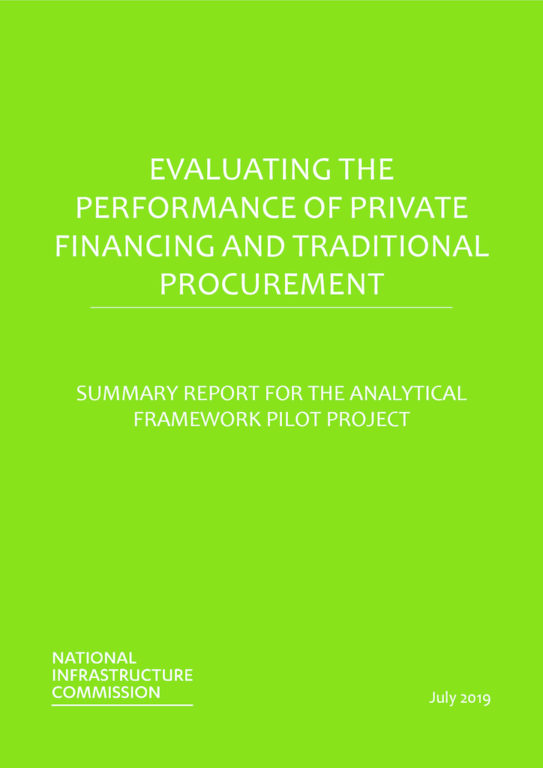
Evaluating the performance of private financing and traditional procurement

Methodology and findings of analytical framework project – annex
Letter to the Chancellor on four tests for a successful National Infrastructure Strategy
National Infrastructure Commission Chair Sir John Armitt has written to the Chancellor of the Exchequer to set out four tests which the forthcoming National Infrastructure Strategy will need to meet, in order to deliver the ambitious, long-term vision for the UK’s infrastructure set out in the National Infrastructure Assessment. These are: A long term perspective – the...
Letter to BEIS Select Committee Chair Rachel Reeves MP on energy efficiency
Following an evidence session to the BEIS Select Committee inquiry on energy efficiency in April 2019, National Infrastructure Commission chief executive Phil Graham wrote to committee chair Rachel Reeves MP to clarify the Commission’s position on energy efficiency and correct two errors in chapter two of the National Infrastructure Assessment which were identified during the session. The...
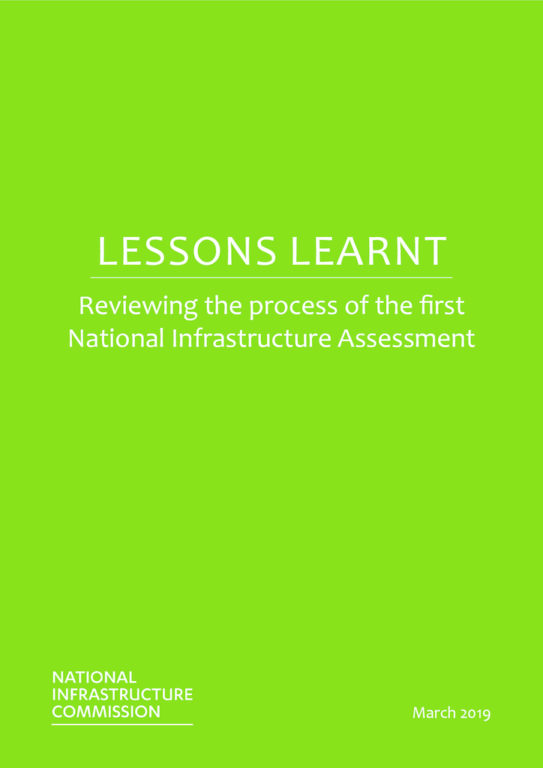
Lessons Learnt: reviewing the process of the first National Infrastructure Assessment
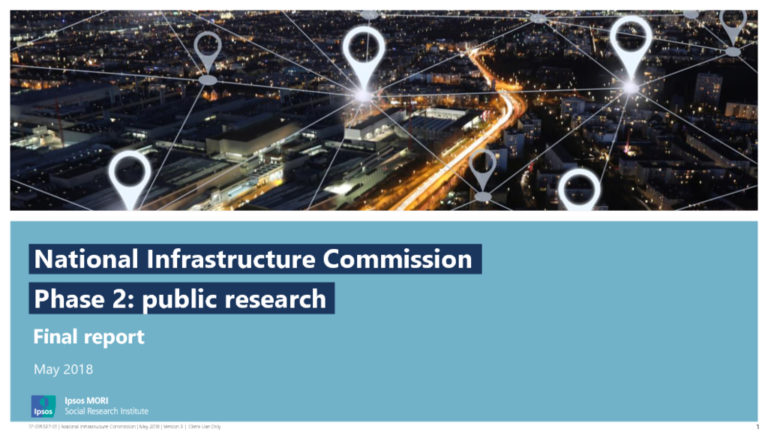
Phase 2 social research
Social research on the public's views on infrastructure services, to help inform the first National Infrastructure Assessment.
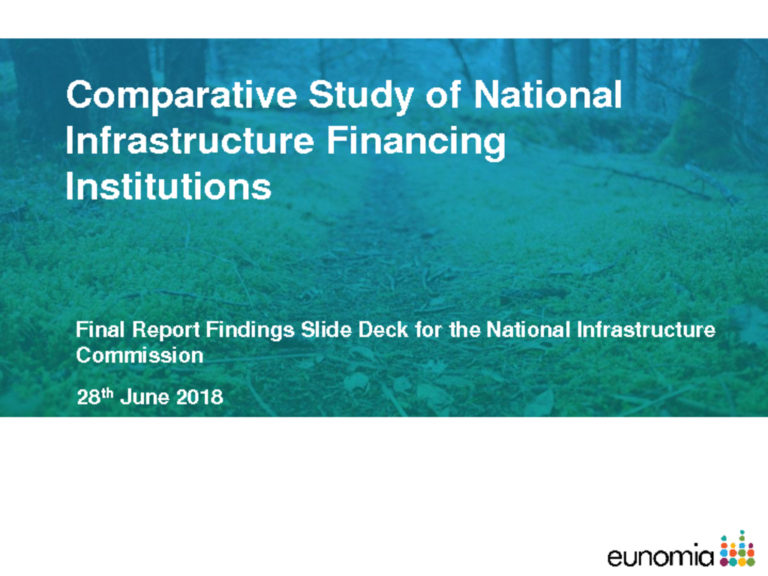
Study of national infrastructure financing institutions

Analysis of drought resilience


